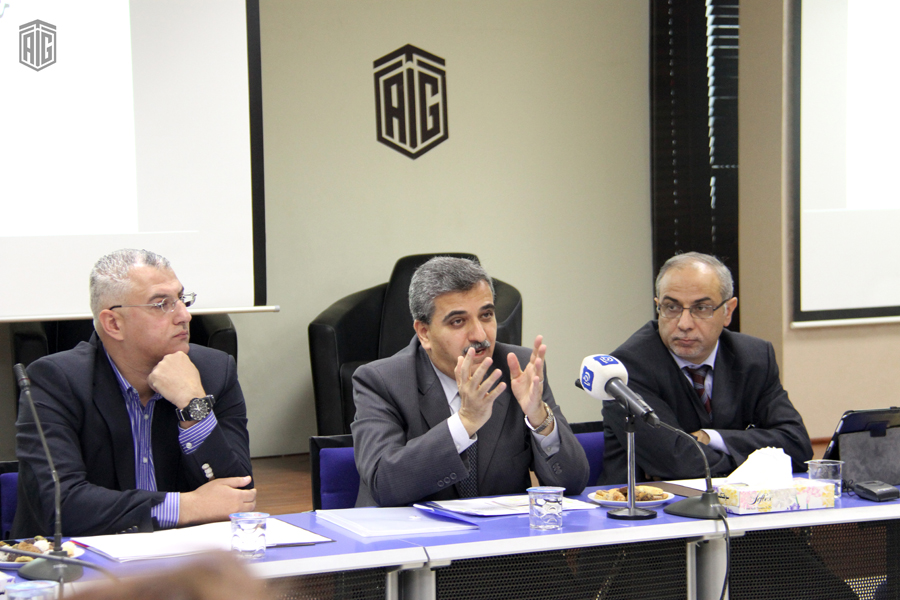Abu-Ghazaleh Raises Questions about Deficit and Government Measures
15 Feb 2014 AMMAN---- February 15, 2014-----The Talal Abu-Ghazaleh Knowledge Forum hosted a roundtable discussion on the 2014 state’s general budget attended by HE Dr. Talal Abu-Ghazaleh, chairman of the Economic Policies Development Forum (EPDF), and a number of its members as well as former ministers, senators, experts and leaders of the civil society.
The session was chaired by HE Dr. Mohammad Abu-Hammour with speeches by HE Dr. Khaled Al-Wazani and Journalist Mr. Salama Al-Dar’awi.
Abu-Hammour expressed his gratitude to the EPDF for hosting the event, which aims at reaching fruitful conclusions in solving problems unnoticed by other parties.
“Is the 2014 budget reformist or austere? Is it part of the reform program? Is it realistic? How could it affect economic growth, investment, debt and standards of living?” he wondered.
He provided answers to all these questions, pointing out that the deficit increased in absolute numbers –contradicting the Economic Reform Programme, which has to stop.
Dr. Abu-Ghazaleh welcomed guests and raised issues related to some articles in the budget. “Government units’ deficits are State deficits, aren’t they? It is better not to list yet-to-be approved aid under revenues, isn’t it? Then, is the budget deficit according to its own figures without discussion JD1,114,377,000? Or is the estimated deficit JD1,114,000,000? Grants and foreign aid are estimated at JD1,150,000,000. Independent government units’ deficit is estimated at JD1,119,000,000. The total is JD3,383,000,000 (approximately 13% of GDP?),” he said.

“Isn’t it necessary now to adopt measures to achieve the budget’s goals, rather than be limited to recommending studies and making wishes of increasing and decreasing? Have these so-called budget foundations been really foundations or mere hopes?” he wondered.
Abu-Ghazaleh asked whether the estimated finance needs were really JD6,140,000,000 or JD7,140,000,000 when adding needs of lending government units JD1 billion to pay off their debts. Then, how much is the public debt? What is its percentage in GDP? Could they be considered finance resources in the budget without agreeing with lenders on them?
“Isn’t it necessary to take legal measures to collect the Treasury dues from evaders and those who decline to pay, rather than abolishing exemptions? Isn’t it better to recommend studying them, as each is estimated at JD1,500,000,000, making a total of JD3,000,000,000? Doesn’t it require having a reserve of possibly uncollected debt to be added to the budget from those who have declined to pay the Treasury for long years according to recognized accounting principles? In this case, how much will be the budget deficit?” he also wondered.
Meanwhile, Al-Wazani presented an overall review of the current economic challenges. He explained the concept and problems of general budget deficit as well as discussed some social and economic indicators and a summary of the budget. He also analyzed the general budget, government units’ revenues and expenditures and public revenues.
He concluded that, in spite of the significance of studying their re-structuring, independent institutions still represent an outstanding issue. He called for a complete review of the companies totally owned by the State, in addition to the means of activating or restructuring them in a way that reduces their unjustified financial burden. He called for collecting outstanding taxes as well as expanding the base of fighting tax-evasion, pointing that the financial deficit and the public debt are only related to current expenditure.

In his turn, Al-Dar’awi presented public revenue estimations within the budget. He briefed the audience on the figures of the 2013 and 2014 budgets, along with the main features of the budget law of 2014. The budget deficit is considered to be one of the major challenges facing the national economy for long years.
He added that major foreign economic challenges still badly affect the economy and the Treasury saying that, in spite of any expectations of receiving grants and aid, the significance of allocating the state’s public outlays according to predicted local revenues.
He said that the last two years witnessed heavy internal and external economic burdens, which made the Jordanian economy face unprecedented challenges.
After that, deep and objective discussion began, as the participants raised important matters. They called for the focus on growth and development ratios and to draw more attention for the budget. They believed that the budget should not be set without a national strategic plan displaying where we are going, what we are achieving and what our targets are, so that problems would not escalate and can be solved.





